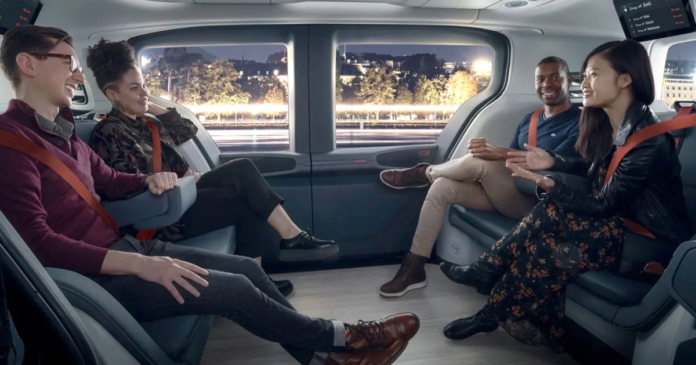Robotaxi company Cruise is “just days away” from getting regulatory approval that would pave the way for mass production of its purpose-built driverless vehicle, CEO Kyle Vogt said on Thursday in comments reported by the Detroit Free Press.
General Motors-backed Cruise unveiled the vehicle — called Origin — in early 2020, presenting the kind of driverless car that we all dreamed of when R&D in the sector kicked off years ago; a vehicle without a steering wheel and without pedals. A vehicle with passenger seats only.
Recommended Videos
Cruise’s current robotaxis, which operate in cities such as San Francisco and Phoenix, are modified vehicles and therefore come with a steering wheel, though companies in the sector are obviously looking to do away with it.
Cruise envisions thousands of the driverless Origin vehicles providing ridesharing services in cities across the U.S. But as the Origin has no steering wheel or other means of manual control found in regular automobiles, there is still a regulatory obstacle course to be navigated, including getting an all-important exemption from federal safety standards, which Vogt believes could be coming this month.
Critics of the current robotaxi services operated by Cruise and another major player — Waymo — fear that having vehicles like the Origin on the road could be a step too far at the current time, pointing to a string of incidents involving autonomous cars that have caused problems on the streets of San Francisco.
Just last month Cruise was ordered by regulators to halve its robotaxi fleet in San Francisco following a crash with a fire truck in which the driverless car’s passenger suffered minor injuries. The decision came just days after California’s Public Utilities Commission made a landmark decision when it voted to allow Cruise and Waymo to expand their paid ridesharing services in the city to all hours of the day instead of just quieter periods.
Vogt has voiced concerns that excessive resistance by critics could hinder the development of an autonomous technology that should ultimately make roads much safer.
Waymo has also shared a design for a vehicle similar to Cruise’s Origin. It’s the result of a partnership with Chinese automaker Geely and is based on its Zeekr minivan. Waymo said riders traveling inside the autonomous vehicle will experience “an interior without steering wheel and pedals, and with plenty of headroom, legroom and reclining seats, screens and chargers within arm’s reach, and an easy to configure and comfortable vehicle cabin.”
Editors’ Recommendations
Futuristic robotaxi could be coming soon, claims Cruise
Recent Comments
on Dubai International Airport sees 41.6 million passengers in first half of year, more than in 2019
on Devout athletes find strength in their faith. But practicing it and elite sports can pose hurdles
on Despite strong Lunar New Year holiday data, consumer spending in China isn’t roaring back just yet
on Dave Portnoy: Taylor Swift’s security should ‘drag Kim Kardashian to jail’ if she attends Eras Tour
on CONCEPT ART: New Details Revealed for Disney Cruise Line Lookout Cay at Lighthouse Point Destination
on “Completely Knocked Me Out”: Rob Lowe Recalls Boxing Match With Tom Cruise On 1983 Brat Pack Classic
on CBS Sports, Serie A announce new TV rights deal; Paramount+ to air over 400 Italian soccer matches
on Cam Newton’s Violent Public Incident Draws Hilarious Reaction From 3x All-Star: “Where Do I Sign Up
on Boston College vs. Army live stream, how to watch online, CBS Sports Network channel finder, odds
on Angel Reese Launches Foundation Dedicated To Empowering Women Through Sports & Financial Literacy
on A weaker dollar, skyrocketing prices and ‘record’ visitor numbers: Good luck in Europe this summer




